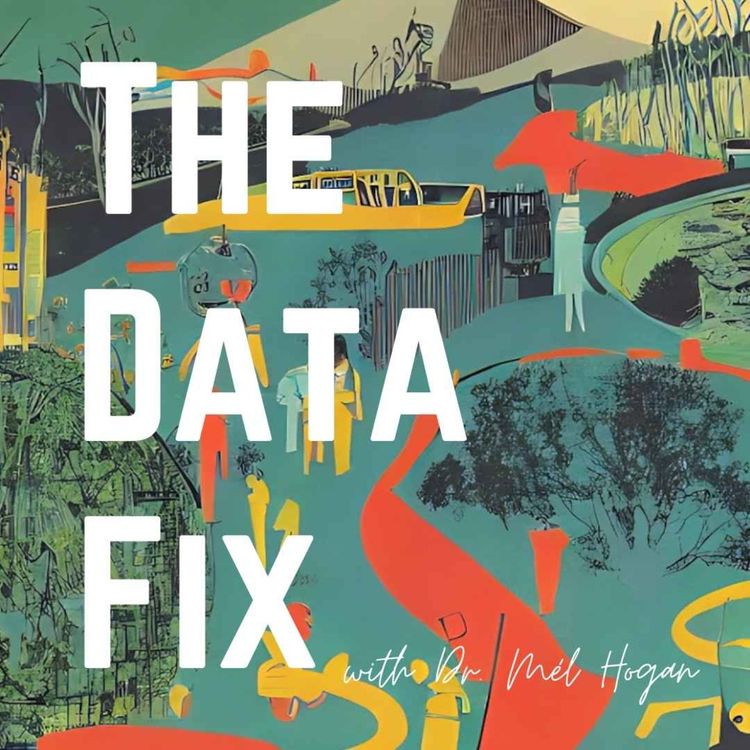Share

The Data Fix with Dr. Mél Hogan
Nostalgia, with Grafton Tanner
Ep. 13
•
What is nostalgia? A memory? A feeling? A weapon?? Tune in to my conversation with Grafton Tanner about the relationship between tech, nostalgia, retrobate and much more! Recorded Mar 31, 2023. Released April 30, 2023.
Grafton Tanner
Yesterday Once More
More episodes
View all episodes

74. Friendship, with Am Johal and Matt Hern
57:36||Ep. 74In this first episode of 2026, I speak with Am Johal and Matt Stern, authors of the "O My Friends, There Is No Friend: The Politics of Friendship at the End of Ecology" (2025) to better understand what friendship means these days... at the "end of ecology". Is friendship political? Can an AI chatbot be a friend? Recorded Jan 16, 2026. Released Jan 19, 2026. Matt Hern, Am Johal O My Friends, There is No Friend (pdf)https://library.oapen.org/bitstream/id/022e1f6f-f14a-4c11-a94c-c95610919f8c/9783839470268.pdfBelow the Radar podcast:https://www.sfu.ca/vancity-office-community-engagement/below-the-radar-podcast.html***New Cover art by Oona Ode!
73. Predictable, with José Marichal
55:30||Ep. 73José Marichal is exceptionally good at making the case for why we should all become algorithmic problems and also much more reflective of our engagement with social media. We are altered by recommendation algorithms -- and we should probably think now about how to renegotiate these terms? Happy holidays! Recorded Nov 27. Released Dec 22, 2025.You Must Become an Algorithmic ProblemRenegotiating the Socio-Technical Contracthttps://bristoluniversitypress.co.uk/you-must-become-an-algorithmic-problem
72. Advocates, with Meg Rintoul and Kathryn Barnwell
01:01:40||Ep. 72In this episode I speak with friends-neighbours-advocates Meg Rintoul and Kathryn Barnwell about current plans in place to build an AI data center in Nanaimo, B-C. -- and allowing ourselves to write a new story about the future. Recorded Nov 27. Released Dec 8, 2025.'Very scary': Nanaimo neighbours have water worries about new data centrehttps://www.reddit.com/r/nanaimo/comments/1oo24s3/very_scary_nanaimo_neighbours_have_water_worries/'An Island concern': Nanaimo water advocates want new data centre stoppedhttps://www.youtube.com/watch?v=0OQzc2bhtXwCBC: AI-related data centres use vast amounts of water. But gauging how much is a murky businesshttps://www.cbc.ca/news/ai-data-centre-canada-water-use-9.6939684
71. Tracking, with Stefanie Felsberger
54:30||Ep. 71In this episode, I got to walk through a recent report called “the high stakes of tracking menstruation” with its author, Stefanie Felsberger, a sociologist of tech & gender. I cannot express enough how much there is to learn from this topic that can help us understand the bigger landscape of tech promises and harms. Recorded Oct 23, 2025. Released Nov 24, 2025.The High Stakes of Tracking Menstruation - MCTD Cambridgehttps://www.mctd.ac.uk/femtech-high-stakes-tracking-menstruation/ https://www.mctd.ac.uk/wp-content/uploads/2025/06/The-High-Stakes-of-Tracking-Menstruation_Accessible.html Menstrual apps harvest data that ‘puts women’s safety at risk’https://www.thetimes.com/uk/healthcare/article/menstrual-apps-harvest-data-that-puts-womens-safety-at-risk-bd0srb8mt? Period: The Real Story of Menstruation (by Kate Clancy)https://press.princeton.edu/books/hardcover/9780691191317/period? Websitehttps://www.stefaniefelsberger.com
70. Surveillance, with Justin Hendrix
52:28||Ep. 70In this episode, I speak with Justin Hendrix, the CEO and Editor of Tech Policy Press, a nonprofit media venture concerned with the intersection of technology and democracy. We talk about ICE (US Immigration and Customs Enforcement), surveillance, and AI. Recorded Oct 21, 2025. Released Nov 10, 2025. Republican Budget Bill Signals New Era in Federal SurveillanceDEAN JACKSON, JUSTIN HENDRIX / JUL 2, 2025https://www.techpolicy.press/republican-budget-bill-signals-new-era-in-federal-surveillance/Amidst Violent Immigration Raids, DHS Turns to Big Tech to Silence DissentJENNA RUDDOCK / OCT 3, 2025https://www.techpolicy.press/amidst-violent-immigration-raids-dhs-turns-to-big-tech-to-silence-dissent/ AI Surveillance on the Rise in US, but Tactics of Repression Not NewDIA KAYYALI / MAR 26, 2025https://www.techpolicy.press/ai-surveillance-on-the-rise-in-us-but-tactics-of-repression-not-new/
69. Sovereign, with Paris Marx
53:58||Ep. 69Host of Tech Won't Save Us and acclaimed tech critic, author, and international speaker, Paris Marx joins me for this episode where we discuss AI futures in a Canadian context: the idea of a "sovereign cloud", an "AI minister", and much more! Recorded Oct 15, 2025. Released Oct 20, 2025.Websitehttps://parismarx.com/Tech Won't Save Ushttps://techwontsave.us/Disconnecthttps://disconnect.blog/im-writing-a-new-book/
68. Witnessing, with Michael Richardson
01:10:48||Ep. 68In this episode, I get to chat with the brilliant Michael Richardson on the concept of "Nonhuman Witnessing" especially in how this relates to algorithms and AI. In his book, "Nonhuman Witnessing" (Duke), he argues that a "radical rethinking of what counts as witnessing is central to building frameworks for justice in an era of endless war, ecological catastrophe, and technological capture". Recorded August 13, 2025. Released August 25, 2025. Nonhuman Witnessing: War, Data, and Ecology after the End of the World (Duke, 2024)https://read.dukeupress.edu/books/book/3310/Nonhuman-WitnessingWar-Data-and-Ecology-after-theWebsite https://www.unsw.edu.au/staff/michael-richardsonBluesky@richardsonma.bsky.social
67. Dopaminergic, with Rohit Revi
58:48||Ep. 67Rohit Revi walks us through paranoia, care, conspiracy, capitalism, and catastrophe, in relation to technology and culture, to draw us into a deeper consideration of collective psychic resources and psychological commons. We talk about psychometry and linger on the dopaminergic. Recorded July 16, 2025. Released August 11, 2025.Great Delirium: Culture, Technology, and Paranoia in the New Age of Catastrophe(2025-02-24) Revi, Rohit; Cultural Studies; Murakami Wood, David; McBlane, Angus
66. Con, with Emily M. Bender and Alex Hanna
56:44||Ep. 66Emily M.Bender and Alex Hanna have been leading the charge against "AI", helping us understand it for the con that it is, and how AI companies are turning to health, education, and other social realms to try to recover their costs. In this episode we discuss LLMs vs. what the AI (and AGI) con is -- who benefits, and who loses -- and much more. Recorded July 15, 2025. Released July 28, 2025.The AI Conhttps://thecon.ai/Mystery AI Hype Theater 3000https://www.dair-institute.org/maiht3k/The predatory fantasy of worker empowerment in AI marketingJustine Zhang, Su Lin Blodgett, Nina MarklAI x Crisis: Tracing New Directions Beyond Deployment and Use workshop, Aarhus 2025.AI isn’t replacing student writing – but it is reshaping ithttps://theconversation.com/ai-isnt-replacing-student-writing-but-it-is-reshaping-it-254878Sparks of Artificial General Intelligence: Early experiments with GPT-4https://arxiv.org/abs/2303.12712